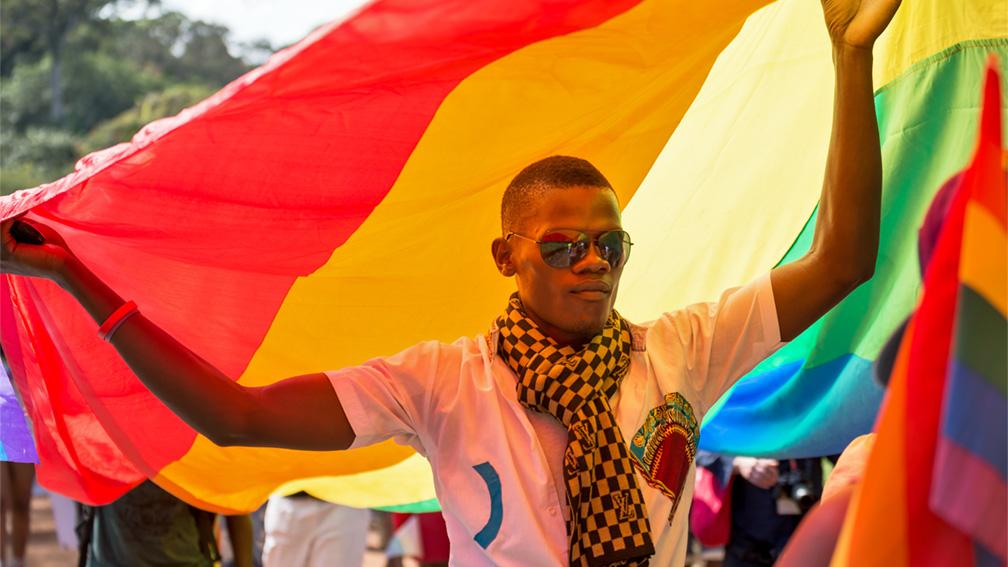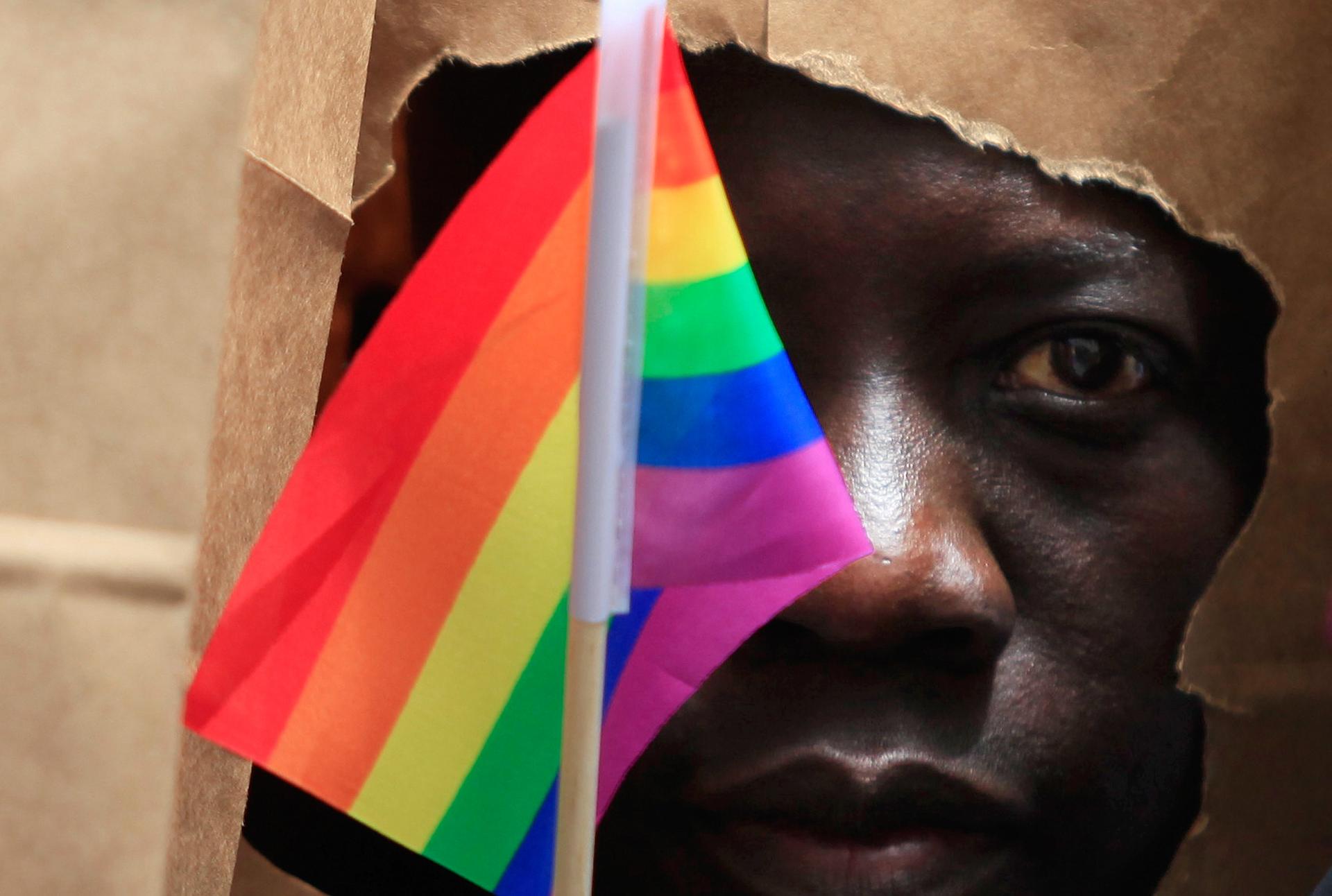An asylum seeker from Uganda covers his face with a paper bag in order to protect his identity as he marches with the LGBT Asylum Support Task Force during the Gay Pride Parade in Boston, Massachusetts on June 8, 2013.
Countries all over the world have gay pride events every year. The annual festivities are usually safe places for lesbian, gay, bisexual, transgender and queer people to celebrate their communities.
That's even been true in recent years in Uganda, a country where it's a crime to be gay.
Unfortunately, it wasn’t the case in Uganda last week.
In the capital Kampala, police raided a Uganda Pride pageant and arrested about 20 people. It’s been alleged that participants were beaten, photographed, and sexually assaulted by officers after being detained at the scene.
Homosexuality is illegal in Uganda under the Penal Code Act, which prohibits “indecent practices,” and is grounds for imprisonment.
Human rights lawyer Nicholas Opiyo says his clients were attacked. “The people I represented and got out of police detention are nursing injuries after a violent assault by the police,” he said.
The Ugandan minister of ethics and integrity, Simon Lokodo, claims there is no violence being used against LGBTQ people.
Lokodo released a statement defending the police, saying the government "will not condone the promotion of the illegal activities of the LGBT movement. Through the Uganda Police Force, [the] Government worked to ensure that the criminal and illegal activities of the Gay community were halted and we will continue to suppress them.”
With tensions high after the arrests, pride organizers canceled a parade planned for last Sunday.
“So many people are living in fear. The community right now is in panic,” Opiyo said.

Pride celebrations in Uganda are discreet affairs, nothing like the grand events held in the United States. For the past five years, Uganda Pride has been exclusively for LGBTQ community members.
“They are private events in secluded places, away from public view,” Opiyo said.
Authorities are made aware of the celebrations ahead of time, and Opiyo says normally the events are allowed to go on without interruption.
In an opinion piece for The Guardian, activist and Uganda Pride organizer Frank Mugisha said last week's violence destroyed his sense of safety.
“Our close community of activists committed to improving the lives of LGBTI Ugandans is vibrant and as strong a movement as it has ever been,” he wrote.
“Uganda Pride 2016 was set to be a long overdue celebration of our hard work and resilience. It was during these celebrations last week that my illusions of safety and hope were cruelly shattered.”
LGBTQ Ugandans face various injustices, officially and in society. They experience rejection by family and community members. They might be publicly insulted, expelled from school, or let go from a job if they identify as gay. Violence is a constant threat.
“The lived experiences of gay people in this country are horrific," Opiyo said.
Opiyo says the injustices are linked to political history and the role of religion in the country.
“Religious groups have a firm grip on this state and they have found patronage in political leaders who are willing to promote there ideals,” Opiyo said.
He hopes the recent violence will compel “the rest of the world to condemn the actions of the Government of Uganda and perhaps that can bring some pressure on them and make them relent and give us space to celebrate our identity.”
Some people have taken to social media to express their thoughts using the hashtag #UGPride2016. Here's a selection:
Read more: These are the faces of gay pride in Uganda.
Countries all over the world have gay pride events every year. The annual festivities are usually safe places for lesbian, gay, bisexual, transgender and queer people to celebrate their communities.
That's even been true in recent years in Uganda, a country where it's a crime to be gay.
Unfortunately, it wasn’t the case in Uganda last week.
In the capital Kampala, police raided a Uganda Pride pageant and arrested about 20 people. It’s been alleged that participants were beaten, photographed, and sexually assaulted by officers after being detained at the scene.
Homosexuality is illegal in Uganda under the Penal Code Act, which prohibits “indecent practices,” and is grounds for imprisonment.
Human rights lawyer Nicholas Opiyo says his clients were attacked. “The people I represented and got out of police detention are nursing injuries after a violent assault by the police,” he said.
The Ugandan minister of ethics and integrity, Simon Lokodo, claims there is no violence being used against LGBTQ people.
Lokodo released a statement defending the police, saying the government "will not condone the promotion of the illegal activities of the LGBT movement. Through the Uganda Police Force, [the] Government worked to ensure that the criminal and illegal activities of the Gay community were halted and we will continue to suppress them.”
With tensions high after the arrests, pride organizers canceled a parade planned for last Sunday.
“So many people are living in fear. The community right now is in panic,” Opiyo said.

Pride celebrations in Uganda are discreet affairs, nothing like the grand events held in the United States. For the past five years, Uganda Pride has been exclusively for LGBTQ community members.
“They are private events in secluded places, away from public view,” Opiyo said.
Authorities are made aware of the celebrations ahead of time, and Opiyo says normally the events are allowed to go on without interruption.
In an opinion piece for The Guardian, activist and Uganda Pride organizer Frank Mugisha said last week's violence destroyed his sense of safety.
“Our close community of activists committed to improving the lives of LGBTI Ugandans is vibrant and as strong a movement as it has ever been,” he wrote.
“Uganda Pride 2016 was set to be a long overdue celebration of our hard work and resilience. It was during these celebrations last week that my illusions of safety and hope were cruelly shattered.”
LGBTQ Ugandans face various injustices, officially and in society. They experience rejection by family and community members. They might be publicly insulted, expelled from school, or let go from a job if they identify as gay. Violence is a constant threat.
“The lived experiences of gay people in this country are horrific," Opiyo said.
Opiyo says the injustices are linked to political history and the role of religion in the country.
“Religious groups have a firm grip on this state and they have found patronage in political leaders who are willing to promote there ideals,” Opiyo said.
He hopes the recent violence will compel “the rest of the world to condemn the actions of the Government of Uganda and perhaps that can bring some pressure on them and make them relent and give us space to celebrate our identity.”
Some people have taken to social media to express their thoughts using the hashtag #UGPride2016. Here's a selection:
Read more: These are the faces of gay pride in Uganda.
We’d love to hear your thoughts on The World. Please take our 5-min. survey.
